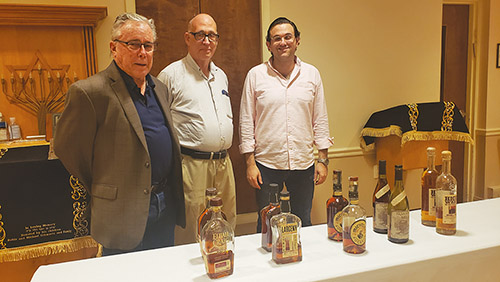


Congregation Ohav Emeth in Highland Park held an event of good spirits on Motzei Shabbat, December 11, drawing over three dozen community members to “Bible and Bourbon”—an evening of enlightening Torah, humorous anecdotes, delicious food, and of course, a variety of bourbons.
Synagogue President Michael Garber noted that the event was the result of a brainstorming effort to come up with programming that would appeal to a broad cross-section of members. Josh Beil, event co-chair, noted that they decided to focus on bourbon for many reasons, not the least of which was that not many people know much about it. He also offered to serve as designated driver for any attendee who, after the samplings, wanted a ride home.
Rabbi Eliyahu Kaufman welcomed attendees, noting that he is not only the spiritual leader of the congregation—at this event, he was the leader of spirits. He added that in this era of COVID, he wanted to make sure people got their shots. He also said he would make his remarks short, so as not to drive the audience to drink.
Shul member Rabbi Meir Lipschitz provided a brief lecture on the history of bourbon, kashrut aspects and other useful information. He stated that straight bourbon does not require kosher certification because of several legal requirements and specified criteria related to its manufacture in the United States. Key amongst them is the fact that bourbon must be made in new charred barrels and consist of only corn and grains. The flavoring comes from the length of time spent in the barrels. Bourbons that are mixed with other liquids and/or removed to other barrels for additional flavoring must state so on their labels and would require a hechsher.
Interestingly, many of the bourbon distillers in the United States are owned by Jewish people, leading to the question of whether their product can be used as it is chametz, and had not been sold over Passover. The discussion continued as to whether bourbon and other liquors can be used for kiddush, Havdala or other ritual purposes. Several rabbinic opinions were noted, but most agree that since alcohol (such as bourbon) is consumed for enjoyment and not to quench thirst, a 1-ounce serving is needed for kiddush and a bracha achrona.
By definition and law, bourbons must be at least 51% corn. The remaining grains can be wheat, barley, etc. If a bourbon is made of 100% corn, Sephardim would be able to consume it on Passover.
Pat McCarthy of Bayway Liquors in Elizabeth presented five bourbons that were used for the sampling. He introduced each one, described their distinctive notes and flavorings, and gave attendees time to savor them. Water and light snacks were available on each table to clear the palate between products. Surprising undertones of some of the samplings included mint, caramel and vanilla.
McCarthy also provided the best ways to taste the bourbon and use your other senses (smell, sight) to pick up the nuances of each sample. Interestingly, bourbon barrels were originally charred centuries ago to remove the odors and lingering flavors of whatever the barrels held previously. At some point, people realized that the charring imparted pleasing flavors and colors to the alcoholic beverage. To maintain distinctiveness, bourbons were required to be made in new barrels, but the charring criteria remained.
Blanche Leichtman of Edison attended the event with several family members. She is a non-drinker, but it was her birthday and her family thought it would be a fun event to attend. They were looking forward to the bourbon tasting, but she was looking forward to the catered food.
Catering was provided by Elegant Events Catering Company, based at the Rabbi Jacob Joseph Yeshiva in Edison, and a new local business: Kosoco (Kosher Southern Comfort), provider of slow-smoked meats.
Jay Dobin of Highland Park attended with one of his sons to not only support the shul, but to meet new people and welcome visitors. Lilah Braun of Highland Park noted that wine tastings have gone sophisticated and upscale, yet “heimishe people still love their liquor.” As Michael Atkin noted, “I came for words of Torah, brochos—and of course, the bourbon.”
Alan Borck of Edison said that as a member of the congregation for 37 years, he was delighted to see generations of young people move to the neighborhood and become active members.










